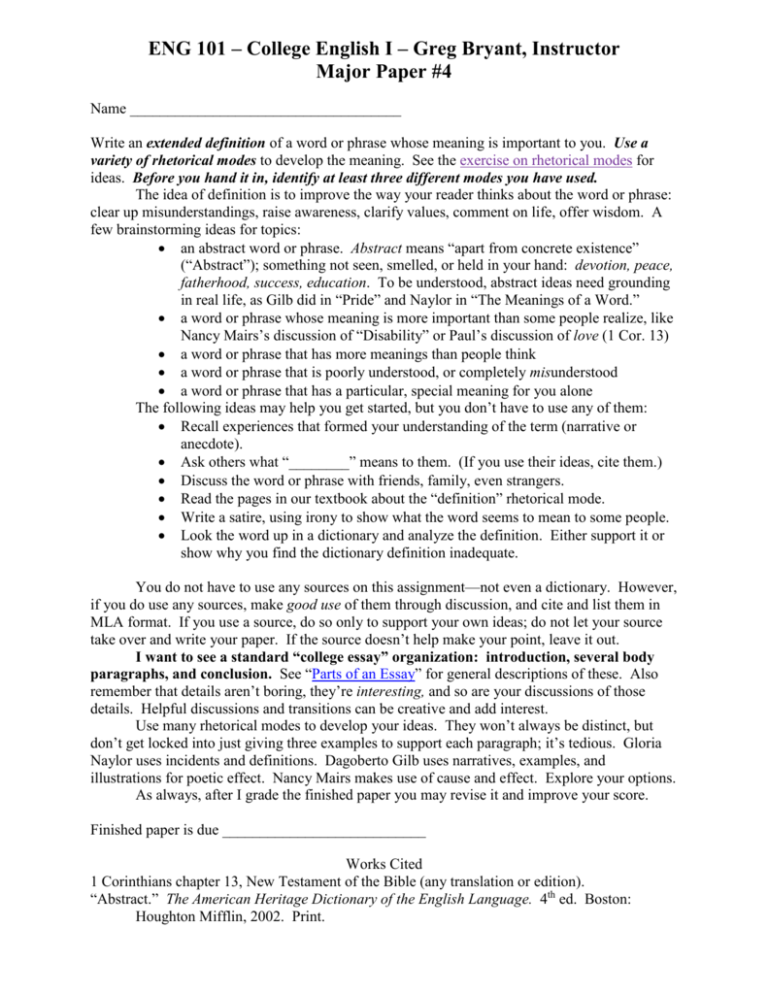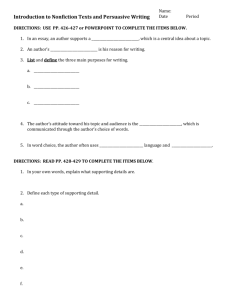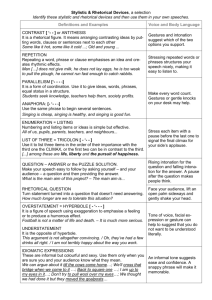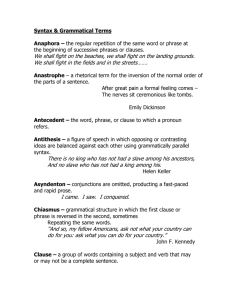Major Paper 4: Extended definition and rhetorical variety
advertisement

ENG 101 – College English I – Greg Bryant, Instructor Major Paper #4 Name ____________________________________ Write an extended definition of a word or phrase whose meaning is important to you. Use a variety of rhetorical modes to develop the meaning. See the exercise on rhetorical modes for ideas. Before you hand it in, identify at least three different modes you have used. The idea of definition is to improve the way your reader thinks about the word or phrase: clear up misunderstandings, raise awareness, clarify values, comment on life, offer wisdom. A few brainstorming ideas for topics: an abstract word or phrase. Abstract means “apart from concrete existence” (“Abstract”); something not seen, smelled, or held in your hand: devotion, peace, fatherhood, success, education. To be understood, abstract ideas need grounding in real life, as Gilb did in “Pride” and Naylor in “The Meanings of a Word.” a word or phrase whose meaning is more important than some people realize, like Nancy Mairs’s discussion of “Disability” or Paul’s discussion of love (1 Cor. 13) a word or phrase that has more meanings than people think a word or phrase that is poorly understood, or completely misunderstood a word or phrase that has a particular, special meaning for you alone The following ideas may help you get started, but you don’t have to use any of them: Recall experiences that formed your understanding of the term (narrative or anecdote). Ask others what “________” means to them. (If you use their ideas, cite them.) Discuss the word or phrase with friends, family, even strangers. Read the pages in our textbook about the “definition” rhetorical mode. Write a satire, using irony to show what the word seems to mean to some people. Look the word up in a dictionary and analyze the definition. Either support it or show why you find the dictionary definition inadequate. You do not have to use any sources on this assignment—not even a dictionary. However, if you do use any sources, make good use of them through discussion, and cite and list them in MLA format. If you use a source, do so only to support your own ideas; do not let your source take over and write your paper. If the source doesn’t help make your point, leave it out. I want to see a standard “college essay” organization: introduction, several body paragraphs, and conclusion. See “Parts of an Essay” for general descriptions of these. Also remember that details aren’t boring, they’re interesting, and so are your discussions of those details. Helpful discussions and transitions can be creative and add interest. Use many rhetorical modes to develop your ideas. They won’t always be distinct, but don’t get locked into just giving three examples to support each paragraph; it’s tedious. Gloria Naylor uses incidents and definitions. Dagoberto Gilb uses narratives, examples, and illustrations for poetic effect. Nancy Mairs makes use of cause and effect. Explore your options. As always, after I grade the finished paper you may revise it and improve your score. Finished paper is due ___________________________ Works Cited 1 Corinthians chapter 13, New Testament of the Bible (any translation or edition). “Abstract.” The American Heritage Dictionary of the English Language. 4th ed. Boston: Houghton Mifflin, 2002. Print. Grading Criteria for Definition Essay Greg Bryant, Instructor Depth (0-12) Focus (0-12) Organization (0-10) Style (0-8) Conventions (0-8) Total Revision totals Name___________________________ knowledge of material; technical vocabulary; challenging ideas thesis; support, rhetorical variety, explanations; staying on target arrangement; transitions; open; close; paragraphing clearness & accuracy of prose; pleasantness of style; word choice grammar, spelling, punctuation, MLA format & documentation 50 possible. Scale: 45 = A40 = B35 = C30 = D- fresh or deep understanding; go beyond the obvious meanings use at least 3 rhetorical modes effectively; thorough discussion intro, several body ¶s, conclusion; a sense of progress toward an end specificity; accuracy; precision; avoid cliché, repetitiousness, wordiness proofreading; sources, if any were used, cited and listed MLA style (this assignment ↑ in particular)





